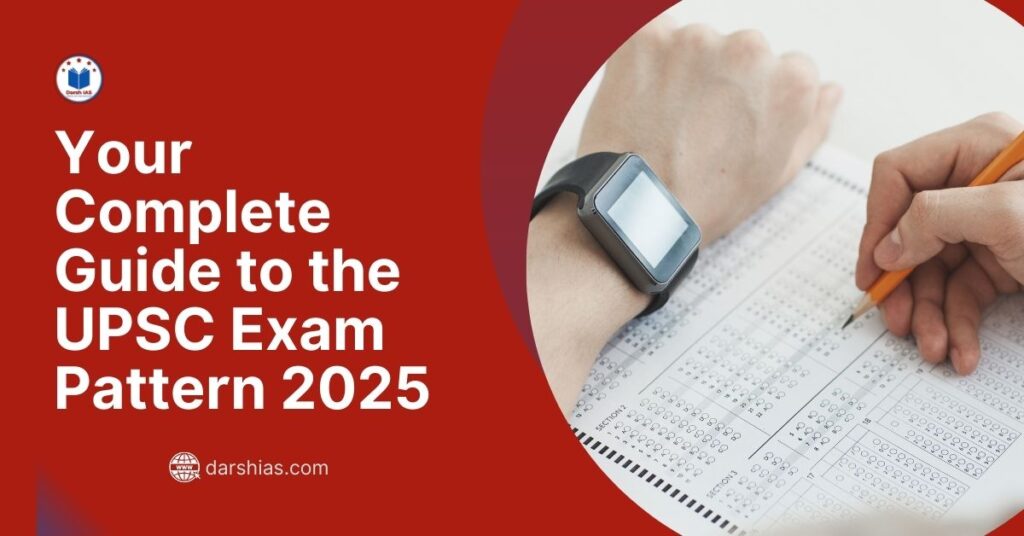The Union Public Service Commission (UPSC) Civil Services Examination (CSE) is often regarded as one of the most prestigious and competitive exams in India. It serves as the gateway to a rewarding career in the Indian Administrative Services (IAS), Indian Police Services (IPS), Indian Foreign Services (IFS), and other esteemed roles within the government framework. Understanding the UPSC exam process is essential to map out a strategic preparation plan that sets you apart from the competition.
This detailed guide will walk you through the IAS exam pattern, highlighting the structure, stages, and strategies to help you prepare effectively.
Overview of the UPSC Civil Services Examination (CSE)
The UPSC CSE is not just an exam; it’s a rigorous process designed to select India’s finest thinkers, strategists, and leaders. What makes this exam truly remarkable is its competitive landscape—aspirants from across the country compete for a handful of elite positions.
To succeed, you need to master not only the vast syllabus but also the exam’s unique structure and challenges, including negative marking schemes, descriptive tests, and much more. Below, we’ll give you a detailed UPSC syllabus overview, covering all its components to ensure you’re well-prepared.
Structure of the UPSC Exam
The UPSC Exam is divided into three key stages:
- Preliminary Examination (Prelims)
- Mains Examination (Mains)
- Personality Test (Interview)
Each stage progressively evaluates different aspects of your knowledge, critical thinking, and interpersonal skills. Let’s break these down one by one.
1. UPSC Prelims
- Format:
Objective-type questions with multiple-choice answers.
- Subjects Covered:
General Studies Paper I – This comprehensive resource covers a wide range of subjects including history, geography, political science, economics, environmental studies, and much more. It provides in-depth insights and knowledge across these disciplines, making it a valuable tool for learners and enthusiasts alike.
General Studies Paper II (CSAT) – Focuses on developing strong decision-making, reasoning, and analytical skills, enabling individuals to evaluate complex situations, think critically, and make informed choices. These skills are essential for problem-solving, understanding data, and creating effective solutions in both personal and professional contexts.
- Scoring System:
Total marks in Paper I and Paper II are 400.
Negative marking applies for incorrect answers, so answer carefully.
CSAT (Paper II) is qualifying, requiring a minimum of 33% to advance.
2. UPSC Mains
- Format:
Descriptive and essay-based questions.
- Papers Included:
General Studies Papers I-IV
Essay Paper
Two Optional Subject Papers (based on the candidate’s choice)
Additional Language and English papers (qualifying).
- Mark Distribution:
Total marks for the Mains examination are 1750.
The marks from this stage are crucial in determining your final rank.
3. Interview (Personality Test)
- Purpose:
The interview aims to evaluate your personality traits, communication skills, and judgment under pressure.
It’s as much about your grasp of current affairs as your opinions and vision for the country.
- Panel Evaluation:
The interview panel consists of experts who assess your suitability for administrative roles.
This stage carries 275 marks, bringing the grand total to 2025 marks (1750 Mains + 275 Interview).
Detailed Examination Pattern
The Prelims Exam Pattern
- Papers:
Paper I has 100 questions.
Paper II (CSAT) contains 80 questions.
- Duration:
Each paper is 2 hours long.
- Topics Covered:
General Studies Paper I includes Indian history, geography, current events, and environmental studies.
Paper II focuses on logical reasoning and analytical abilities.
The Mains Exam Pattern
- Breakdown of General Studies Papers (I-IV):
Paper I: Indian Heritage and Culture, History, and Geography.
Paper II: Governance, Constitution, Polity, International Relations.
Paper III: Technology, Economic Development, Bio-diversity, Environment, and Disaster Management.
Paper IV: Ethics, Integrity, and Aptitude.
- Optional Subject Papers:
The selection of your optional subject (e.g., public administration, sociology) can be a game-changer. Research and pick wisely!
- Essay Writing:
Mastering the essay paper is vital. Focus on a structured approach, presenting balanced perspectives on diverse topics.
The Interview Process

- Format:
Your interview will include scenario-based questions that test your decision-making and administrative abilities.
- Focus on Current Affairs:
Questions may revolve around recent events, policies, or your unique insights into national and global issues.
Preparation Strategies for Each Stage
Tips for Prelims Preparation
Study materials should cover the Indian Polity (by Laxmikanth), History (Ncert books), Environment, and Current Affairs.
Mock tests are non-negotiable. They’ll help you understand the pattern and improve accuracy with time constraints.
Focus on eliminating options in multiple-choice questions to offset the impact of negative marking schemes.
Mains Preparation Techniques
Descriptive writing skills are key. Practice summarizing information while maintaining clarity.
Use a clock while practicing to simulate exam conditions and enhance time management.
Take advantage of previous years’ question papers to analyze recurring themes.
Preparing for the Interview
Stay updated on current affairs and critically analyze the issues from multiple dimensions.
Consider attending mock interviews through coaching programs like Darsh IAS for personalized feedback.
Focus on personality development. Communication, clarity of thought, and composure are decisive factors.
Common Myths About the UPSC Exam Pattern
Myth: The exam is impossible to crack without coaching.
Reality: Strategic self-preparation, supplemented with quality study resources, can yield remarkable results.
Myth: You need to study 16 hours a day.
Reality: Consistency and efficient study techniques matter more than clocking long hours.
Start Preparing Strategically Today
Understanding the IAS exam process is your first step to success. With the right knowledge, tools, and strategies, the exam becomes less daunting and more achievable.
At Darsh IAS, we offer tailored mentorship programs and exclusive resources to help you confidently tackle every stage of the exam. From mock interviews to in-depth general studies paper reviews, we ensure our students are equipped to excel.
Sign up today to access our expert-curated courses and take your first step towards a fulfilling career in civil services. Success awaits those who prepare strategically!
Conclusion
Dispelling common myths about the UPSC exam pattern is essential in guiding aspirants towards a more accurate understanding of the requirements and preparation strategies. With the right approach, success in the exam is within reach.
Remember, quality self-preparation combined with reliable study resources can yield remarkable results, making coaching not an absolute requirement. It’s not about studying for long hours, but rather about consistency and efficient study techniques.
The key lies in understanding the exam process, equipping yourself with the right knowledge, tools, and strategies, and accessing tailored mentorship programs and exclusive resources. At Darsh IAS, we are here to support you on your journey towards a fulfilling career in civil services. Join us today to take your first confident step towards success.







